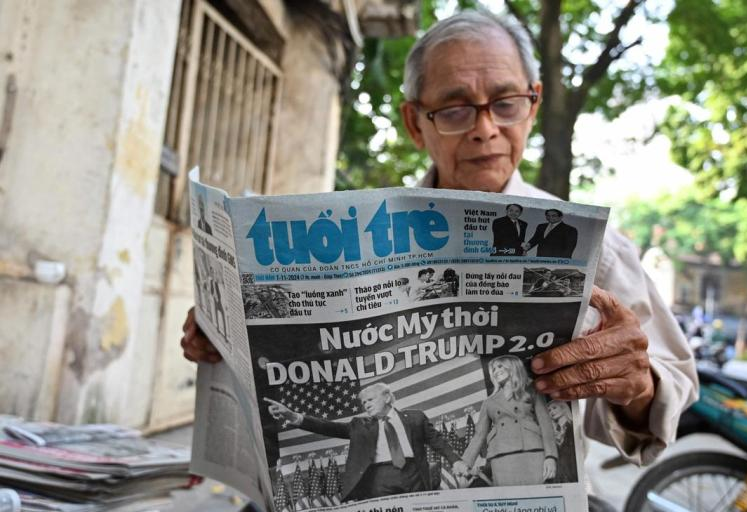
Tokyo (AFP) - If US President-elect Donald Trump pushes ahead with his campaign promise to impose massive tariffs on China after taking office, it is expected to trigger a new wave of factory relocations from China to other countries, and some Asian countries will benefit.
However, if the Sino-US trade war intensifies, the stability of markets everywhere will be affected and damaged, among which Southeast Asian countries whose production chains are closely linked to China and have received a large amount of Chinese investment are believed to be the biggest impact.
One of Mr Trump's campaign promises was to impose tariffs of 10 to 20 per cent on all imports. He also vowed to impose a 60 percent tariff on all Chinese goods entering the United States to balance trade between the two countries.
While not directly targeting ASEAN countries, the tariffs on China have led to a drop in U.S. demand for Chinese goods and will also lead to a drop in U.S. demand for ASEAN goods, said Oxford Economics analyst Samdin.
The extent of the impact will depend on individual economies' trade links with the US. In Southeast Asia, for example, the United States accounted for 39.1% of Cambodia's total exports, 27.4% of Vietnam's total exports, 17% of Thailand's total exports, and 15.4% of the Philippines' total exports.
Transit countries will be targeted for additional tariffs
Trump imposed steep tariffs on China during his first term in office in 2018, prompting Chinese companies to transship goods through other Asian countries to avoid paying taxes. If this were to happen again, these transit countries would also be the target of US tariffs.
"Vietnamese electronics exports to the US could be targeted by Trump to stop the transshipment of Chinese electronics through Vietnam to the US since 2018," said Lloyd Chan, senior analyst at Bank of Mitsubishi UFJ.
Mr Herrmann, chief economist at Oxford Economics, added: "There are a lot of Chinese components in Indian products, so India could also be a target for US protection measures."
Ajay, co-founder of the New Delhi-based Global Trade Research Initiative, said Trump could also impose higher tariffs on Indian goods such as cars, textiles, pharmaceuticals and wine, which could make Indian products less competitive in the United States.
In the medium term, these negative effects can be offset by building plants in countries other than China. During Trump's first term as president, many companies accelerated the implementation of the "China plus one" strategy, shifting the focus of production from China to India, Malaysia, Thailand and Vietnam.
At present, Foxconn, Pegatron, Samsung and other well-known companies have invested in Vietnam, making Vietnam the world's second largest smartphone exporter after China. "More and more companies are looking to set up a second or third production base outside China," said Jaspat, president of the European Chamber of Commerce in Vietnam.
Mr. Sitkoff, executive director of the American Chamber of Commerce in Hanoi, also said American companies and investors are interested in Vietnam and expect that to continue after Mr. Trump takes office.
China itself also has many enterprises to transfer out, such as solar energy, batteries, electric vehicles and mining and other fields of enterprises have begun to invest in Vietnam, Indonesia and other countries.
But whether it is low-end or high-tech production, China's competitive advantage in terms of price, scale and quality will be difficult to replicate, says Nomura, a Japanese bank.
The IMF's deputy director for Asia, James Helbling, said restructuring production chains could lead to efficiency losses and higher prices, which could negatively impact global growth. In other words, Asian countries may gain export market share, but the situation will eventually worsen due to weak global demand.

The European Commission released a package of measures for the automotive industry on Tuesday (December 16th), proposing to relax the requirements related to the "ban on the sale of fuel vehicles" by 2035.
The European Commission released a package of measures for …
Venezuela's Vice President and Oil Minister Rodriguez said …
On December 16 local time, the Ministry of Space Science Ex…
Recently, a highly anticipated phone call between the defen…
Right now, the world's major central banks are standing at …
Recently, according to Xinhua News Agency, the news of a tr…